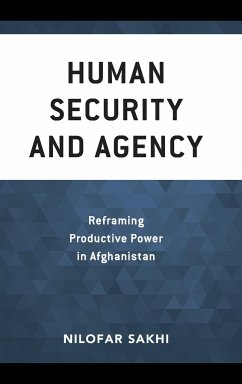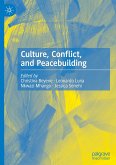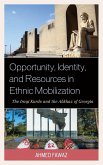- Gebundenes Buch
- Merkliste
- Auf die Merkliste
- Bewerten Bewerten
- Teilen
- Produkt teilen
- Produkterinnerung
- Produkterinnerung
This study investigates how human security manifests itself in the context of Afghanistan and explores the factors that promote and impede its development.
Andere Kunden interessierten sich auch für
![Culture, Conflict, and Peacebuilding Culture, Conflict, and Peacebuilding]() Culture, Conflict, and Peacebuilding88,99 €
Culture, Conflict, and Peacebuilding88,99 €![Minority Rights and Minority Protection in Europe Minority Rights and Minority Protection in Europe]() Timofey AgarinMinority Rights and Minority Protection in Europe72,99 €
Timofey AgarinMinority Rights and Minority Protection in Europe72,99 €![Opportunity, Identity, and Resources in Ethnic Mobilization Opportunity, Identity, and Resources in Ethnic Mobilization]() Ahmed Abdel-Hafez FawazOpportunity, Identity, and Resources in Ethnic Mobilization159,99 €
Ahmed Abdel-Hafez FawazOpportunity, Identity, and Resources in Ethnic Mobilization159,99 €![Identities, Histories and Values in Postcolonial Nigeria Identities, Histories and Values in Postcolonial Nigeria]() Identities, Histories and Values in Postcolonial Nigeria164,99 €
Identities, Histories and Values in Postcolonial Nigeria164,99 €![Israel and Its Arab Minority, 1948-2008 Israel and Its Arab Minority, 1948-2008]() Gadi HitmanIsrael and Its Arab Minority, 1948-2008137,99 €
Gadi HitmanIsrael and Its Arab Minority, 1948-2008137,99 €![Minority Rights and Minority Protection in Europe Minority Rights and Minority Protection in Europe]() Timofey AgarinMinority Rights and Minority Protection in Europe206,99 €
Timofey AgarinMinority Rights and Minority Protection in Europe206,99 €![Anti-Sectarianism and Reconciliation in Northern Ireland Anti-Sectarianism and Reconciliation in Northern Ireland]() Cillian McGrattanAnti-Sectarianism and Reconciliation in Northern Ireland30,99 €
Cillian McGrattanAnti-Sectarianism and Reconciliation in Northern Ireland30,99 €-
-
-
This study investigates how human security manifests itself in the context of Afghanistan and explores the factors that promote and impede its development.
Hinweis: Dieser Artikel kann nur an eine deutsche Lieferadresse ausgeliefert werden.
Hinweis: Dieser Artikel kann nur an eine deutsche Lieferadresse ausgeliefert werden.
Produktdetails
- Produktdetails
- Verlag: Globe Pequot Publishing Group Inc/Bloomsbury
- Seitenzahl: 160
- Erscheinungstermin: 14. Oktober 2020
- Englisch
- Abmessung: 235mm x 157mm x 13mm
- Gewicht: 392g
- ISBN-13: 9781786614544
- ISBN-10: 1786614545
- Artikelnr.: 58700005
- Herstellerkennzeichnung
- Produktsicherheitsverantwortliche/r
- Europaallee 1
- 36244 Bad Hersfeld
- gpsr@libri.de
- Verlag: Globe Pequot Publishing Group Inc/Bloomsbury
- Seitenzahl: 160
- Erscheinungstermin: 14. Oktober 2020
- Englisch
- Abmessung: 235mm x 157mm x 13mm
- Gewicht: 392g
- ISBN-13: 9781786614544
- ISBN-10: 1786614545
- Artikelnr.: 58700005
- Herstellerkennzeichnung
- Produktsicherheitsverantwortliche/r
- Europaallee 1
- 36244 Bad Hersfeld
- gpsr@libri.de
Nilofar Sakhi is an adjunct faculty at George Mason University. Sakhi has been involved in Afghan peace process since 2011 and remained a regular commentator and speaker in variety of international summits and conferences, and also in media. In addition, Sakhi has been managing a wide range of development and governance programs including human security, democracy and civil society, women's rights, higher education and private sector development. Nilofar has more than 14 years of experience in management and leadership. She managed international organizations, education institutions and national local organization. She has years of experience working with American University of Afghanistan as an executive director and with Open Society Foundations as a country Director in Afghanistan. Nilofar Sakhi is a founder of number of civil society entities such as NGOs, radio station, and libraries. Sakhi is a Fulbright scholar. She was a visiting fellow at National Endowment for Democracy, Columbia University, International Center for Tolerance Education, and a fellow at Asia Society. Nilofar holds a PhD from George Mason University, and graduated from SIAS of Johns Hopkins University as a Master of International Public Policy. She also has a second graduate degree from Eastern Mennonite University in Conflict Transformation and Peacebuilding.
1. The Socio-Economic and Political History of Afghanistan and its Impact
on Human Agency1.1. Introduction 1.2. Social Context 1.3. Economic
Context1.4. Political Context1.5. National Solidarity Program (NSP) 1.6.
Traditional Society1.7. Ethnicity and Religion in Afghanistan 2. The
Concept of Empowerment-Building Human Agency 2.1. Concept of
Empowerment2.2. Productive Power2.3. Development of Human Security Through
Productive Power2.4. Protection of Life and Property2.5. Absence of Fear
and Threats 2.6. Economic Opportunities2.7. Freedom and Dignity2.8.
Manifestations of Human Security through Productive Power 2.9. The Factors
that Impede the Process2.10. The Social Limitations of a Traditional
Society3. Smart Strategy/Productive Power3.1. Concept of Human Security in
Post-Conflict Reconstruction3.2. The Concept of Productive Power3.3.
Impeding factors3.4. Social Institutions and Norms3.5. Political
Systems3.6. Conclusion 3.7. Policy Recommendations for Effective Human
Security Programs
on Human Agency1.1. Introduction 1.2. Social Context 1.3. Economic
Context1.4. Political Context1.5. National Solidarity Program (NSP) 1.6.
Traditional Society1.7. Ethnicity and Religion in Afghanistan 2. The
Concept of Empowerment-Building Human Agency 2.1. Concept of
Empowerment2.2. Productive Power2.3. Development of Human Security Through
Productive Power2.4. Protection of Life and Property2.5. Absence of Fear
and Threats 2.6. Economic Opportunities2.7. Freedom and Dignity2.8.
Manifestations of Human Security through Productive Power 2.9. The Factors
that Impede the Process2.10. The Social Limitations of a Traditional
Society3. Smart Strategy/Productive Power3.1. Concept of Human Security in
Post-Conflict Reconstruction3.2. The Concept of Productive Power3.3.
Impeding factors3.4. Social Institutions and Norms3.5. Political
Systems3.6. Conclusion 3.7. Policy Recommendations for Effective Human
Security Programs
1. The Socio-Economic and Political History of Afghanistan and its Impact
on Human Agency1.1. Introduction 1.2. Social Context 1.3. Economic
Context1.4. Political Context1.5. National Solidarity Program (NSP) 1.6.
Traditional Society1.7. Ethnicity and Religion in Afghanistan 2. The
Concept of Empowerment-Building Human Agency 2.1. Concept of
Empowerment2.2. Productive Power2.3. Development of Human Security Through
Productive Power2.4. Protection of Life and Property2.5. Absence of Fear
and Threats 2.6. Economic Opportunities2.7. Freedom and Dignity2.8.
Manifestations of Human Security through Productive Power 2.9. The Factors
that Impede the Process2.10. The Social Limitations of a Traditional
Society3. Smart Strategy/Productive Power3.1. Concept of Human Security in
Post-Conflict Reconstruction3.2. The Concept of Productive Power3.3.
Impeding factors3.4. Social Institutions and Norms3.5. Political
Systems3.6. Conclusion 3.7. Policy Recommendations for Effective Human
Security Programs
on Human Agency1.1. Introduction 1.2. Social Context 1.3. Economic
Context1.4. Political Context1.5. National Solidarity Program (NSP) 1.6.
Traditional Society1.7. Ethnicity and Religion in Afghanistan 2. The
Concept of Empowerment-Building Human Agency 2.1. Concept of
Empowerment2.2. Productive Power2.3. Development of Human Security Through
Productive Power2.4. Protection of Life and Property2.5. Absence of Fear
and Threats 2.6. Economic Opportunities2.7. Freedom and Dignity2.8.
Manifestations of Human Security through Productive Power 2.9. The Factors
that Impede the Process2.10. The Social Limitations of a Traditional
Society3. Smart Strategy/Productive Power3.1. Concept of Human Security in
Post-Conflict Reconstruction3.2. The Concept of Productive Power3.3.
Impeding factors3.4. Social Institutions and Norms3.5. Political
Systems3.6. Conclusion 3.7. Policy Recommendations for Effective Human
Security Programs








